
Digital Learning Etiquette: Provide guidelines for online communication, netiquette, and respectful behavior.
- Subject:
- Educational Technology
- Higher Education
- Material Type:
- Teaching/Learning Strategy
- Author:
- Patrick Smith
- Date Added:
- 09/27/2023

Digital Learning Etiquette: Provide guidelines for online communication, netiquette, and respectful behavior.

This resource provides pre-service or inservice teachers a guide to developing a virtual learning curriculum. It provides teachers a guide on how to take existing lessons designed for a face-to-face format and revise them to be used in an online format. This resources fits a part of the Texas requirements for Digital Literacy training for teacher candidates.TEC, §21.001, 8 C ii
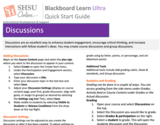
Discussions are excellent ways to enhance student engagement, encourage critical thinking, and increasing interactions with fellow student's ideas. This guide covers adding discussions, discussion settings, as well as analytics and grading in Blackboard Ultra courses.
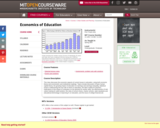
This class discusses the economic aspects of current issues in education, using both economic theory and econometric and institutional readings. Topics include discussion of basic human capital theory, the growing impact of education on earnings and earnings inequality, statistical issues in determining the true rate of return to education, the labor market for teachers, implications of the impact of computers on the demand for worker skills, the effectiveness of mid-career training for adult workers, the roles of school choice, charter schools, state standards and educational technology in improving K-12 education, and the issue of college financial aid.

This module introduces learners to critical discourse analysis (CDA) of education technologies (EdTech) that facilitate learning activities, such as video-based platforms and Learning Management Systems (LMS). The module guides learners to attend to the ways that EdTech providers (re)imagine classrooms as multimodal, monitored, and data-intensive spaces.
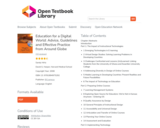
Education for a Digital World contains a comprehensive collection of proven strategies and tools for effective online teaching, based on the principles of learning as a social process. It offers practical, contemporary guidance to support e-learning decision-making, and instructional choices, as well as program and course planning, and development.
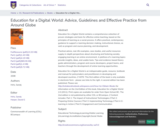
Education for a Digital World: Advice, Guidelines and Effective Practice from Around Globe
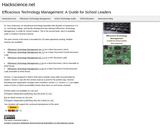
Dr. Gary Ackerman, an educational technology specialist with decades of experience in K-12, community college, and faculty development has released Efficacious Technology Management: A Guide for School Leaders. This is his second book, and it is available under a Creative Commons license.
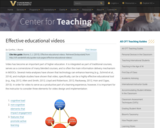
Unlock the key components and strategies for designing and implementing educational videos that truly captivate and educate. Learn about essential elements, such as storytelling, visuals, and pacing, that elevate the effectiveness of educational video content.

Helping students to understand how to approach/read/interact with course materials can get them started down the road to success. For instructors, it is an efficient use of your time as it reaches multiple students, and still provides a level of engagement that students will appreciate.
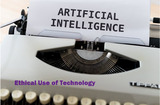
This book is the result of a co-design project in a class in the Masters of Education program at the University of Calgary. The course, and the resulting book, focus primarily on the safe and ethical use of technology in digital learning environments. The course was organized according to four topics based on Farrow’s (2016) Framework for the Ethics of Open Education and discusses Artificial Intelligence (AI) , social networking services (SNS), 3D printing, resource sharing, adaptive learning systems, STEM, assistive technologies, admissions, and communications. In each of the nine chapters, the authors discuss the connection to the value of technology in education, and practical possibilities of learning technologies for inclusive, participatory, democratic, and pluralistic educational paradigms.
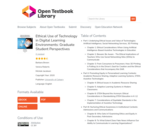
This book is the result of a co-design project in a class in the Masters of Education program at the University of Calgary. The course, and the resulting book, focus primarily on the safe and ethical use of technology in digital learning environments. The course was organized according to four topics based on Farrow’s (2016) Framework for the Ethics of Open Education.

The Ethics of AI is a free online course created by the University of Helsinki. The course is for anyone who is interested in the ethical aspects of AI – we want to encourage people to learn what AI ethics means, what can and can’t be done to develop AI in an ethically sustainable way, and how to start thinking about AI from an ethical point of view.

Slide deck on exploring the possibilities of Open Educational Resources.

Slide deck on exploring OER textbook alternatives.

This resource serves as a resource for those engaged in exploring open at Oklahoma State University.

Presentation of ethnographic research on AI in higher education and future jobs.

Engagement in online courses is key for student success, teacher evaluation and the overall course experience. A great way to promote student engagement in your online course is to work on feedback. Students that receive regular feedback tend to perform better and as a result have good opinions of their time in the course.

Slide deck on finding OER resources and integrating them into instructional plans.
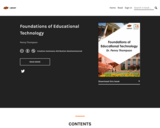
What is educational technology? The current definition provided by AECT is “the ethical study and application of theory, research, and practices to advance knowledge, improve learning and performance, and empower learners through strategic design, management, implementation, and evaluation of learning experiences and environments using appropriate processes and resources.”
Word Count: 22753